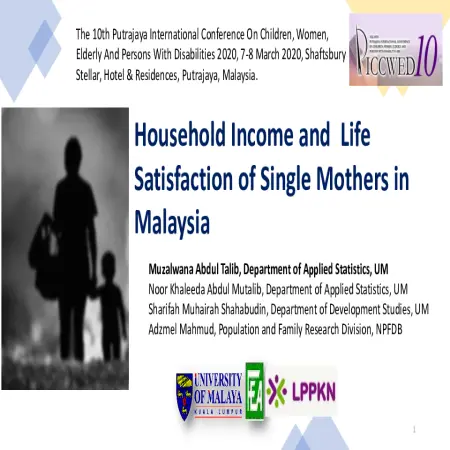| Item type |
Conference or Workshop Item |
| Subjects |
300 Social sciences > 305 Social groups |
| Division/Agency |
LPPKN - National Population and Family Development Board, Malaysia: Population and Family Research Division |
| Keywords |
Single mother, Women, Poverty, Socio-economy, Life satisfaction |
| Additional Information |
Muzalwana Abdul Talib, Department of Applied Statistics, UM
Noor Khaleeda Abdul Mutalib, Department of Applied Statistics, UM
Sharifah Muhairah Shahabudin, Department of Development Studies, UM
Adzmel Mahmud, Population and Family Research Division, NPFDB |
| Abstract |
This study attempts to explore the socio –demographic and economic background of single mothers in Malaysia and to examine their income category and level of poverty. This study utilizes the Fifth Malaysian Population Survey (MPFS5) data. However, for this study, the target respondents are working single mothers (either widowed, divorced, separated); aged 15- 59 years old; residing in Peninsular Malaysia and have children staying together with them. Findings from this study reveal that household income of single mothers falls under the B40 category but there is not enough evidence to claim that their household income is below the poverty line. Chi – Square test of associations prove relationships between poverty level to socio – demographic variables such as level of education and residential states, while PLS – SEM techniques show that income category of single mothers is somehow related to the predictors of life satisfaction construct and the overall life satisfaction. Single mothers are already facing limited job market and reduced salary with their low level of educational attainment. Therefore, some suggested policy recommendations are to protect and promote single mothers involved in elementary occupations and to create more quality jobs to develop these women from the existing low-paid of the informal into the formal sectors. |





